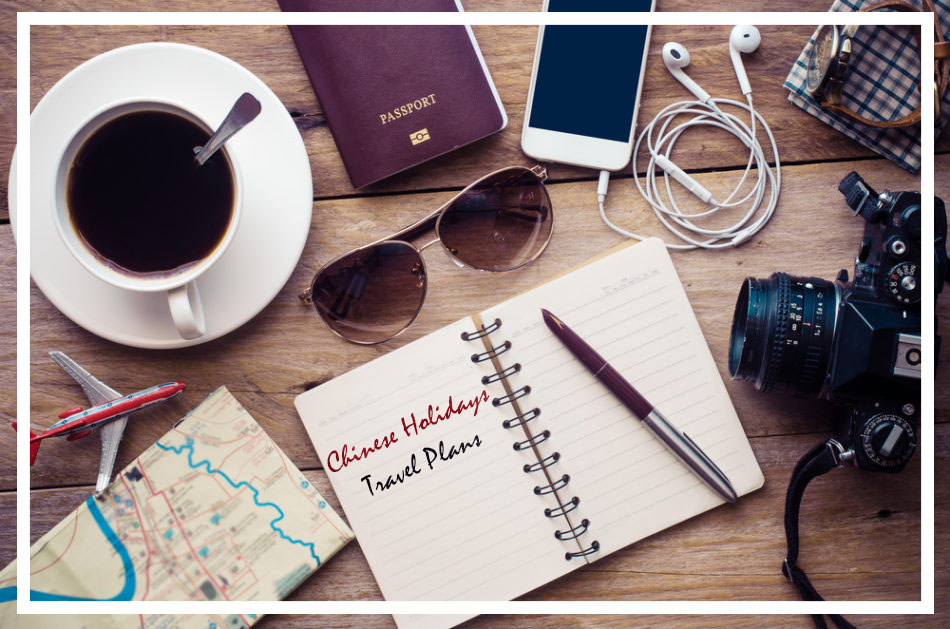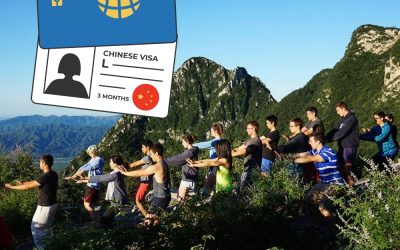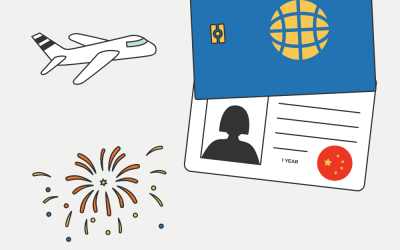It’s almost that most wonderful time of the year again, or at least here in China. While in most parts of the world, the new year started on January 1st, in China the Chinese don’t consider it a new year until this January 28th. And that means a whole new set of Chinese holidays is on the calendar!
The Chinese Holidays Rush
In China, most workers only have these Chinese festivals and public holidays as their time off, in an otherwise grueling work schedule throughout the year. During these periods of Chinese holidays, traveling within China by trains, planes, coaches and subways can be very busy and not enjoyable to some. However, if you do intend to use these holiday periods to travel, it’s best to plan and book your holidays as early as you can (we can’t stress this enough!). Otherwise you might find yourself with expensive options or no options at all! So before that happens, let’s look at the complete list of 2017 holidays in China.
Chinese New Year 春节 (Chūnjié)
Actual Festival Date: January 28th
Holidays: January 27th – February 2nd
Each year in the Chinese calendar is represented by one of twelve animals in the Chinese Zodiac. And according to the Chinese calendar, 2017 will be the year of the Rooster and will officially begin on January 28th. In the western traditions, by this time in the year, most new year resolutions have been forgotten. However, not all hope is lost, as there’s a second chance to get it right with the Chinese New Year.
The Chinese New Year or the Spring Festival, is celebrated by almost a sixth of the world’s population. It is also very similar to the Western one, swathed in traditions and rituals. This lengthy celebration takes place over 15 days with family reunions being the most prominent part of the custom. The distribution of Hong Bao 红包(hóngbāo), meaning Red Packet, is also an integral part of the festival. This involves married couples giving money in red envelopes as a symbol of blessings to children and unmarried adults. Then the family goes around giving greetings from door to door, starting from their relatives and then their neighbors and friends.
This is undoubtedly the biggest Chinese festival of the year and without a shadow of a doubt the worst time to travel; tickets go fast! Or if you haven’t got a ticket and want to visit a scenic area in China, be prepared to sit on the floor of the carriage!
Holiday tip:
Go abroad instead of traveling in China. And book your ticket as early as 5 – 6 months in advanced and go one or two days before the Chinese New Year’s eve and come back a few days after the official holiday period has ended.
If you are stuck in China, do not travel by car as you’ll most likely end in traffic jams. Trains will be the most reliable mode of transport, but tickets will usually be sold out fast.
Tomb Sweeping Festival 清明节 (Qīngmíng Jié)
Actual Festival Date: April 4th
Holidays: April 2nd – 4th
This date is indicated on the Chinese calendar by the two characters: qīng meaning ‘pure’ or ‘clean’, and míng which means ‘brightness’. Combined together, Qingming means clean and just. Qing ming rituals not only include weeding the tombstone area, cleaning of the headstone and replacing the wilted flowers with fresh ones, but also the lighting of incense and burning of imitation paper money. The burning of the imitation money is for the deceased to use in the afterlife.
The imitations burnt are no longer limited to just money. In recent years, the burning of paper imitations of a wide variety of consumer goods has become popular. This includes all manner of objects, such as iPhones, designer handbags, houses and sports cars. In addition, food is laid out in front of the headstone as an offering to the spirits of the deceased. Each family member comes in front of the headstone and bows three times with their right fist held cupped in their left hand. Some families will then eat the food at the grave site, akin to having a picnic with their deceased relatives. It is said to bring good luck to eat the food that was offered to the deceased. Some families may also set off firecrackers to scare off evil spirits and to alert the deceased relatives that they are there to pay their respects.
Holiday tip:
This is actually not a bad time to travel in China as most Chinese people will only go back to their hometowns to visit their ancestors instead of visiting tourist sites. Book your flights at least 2 months earlier.
Dragon Boat Festival 端午节 (Duānwǔ Jié)
Actual Festival Date: May 30th
Holidays: May 28th – 30th
The Dragon Boat Festival is one of the short Chinese holidays in China. Legend has it that this holiday honors the tragic death of Chu Yuan in 288 BC. Chu Yuan was a poet and the minister of the state at the time of Warring States. The King was captured during fighting and in honor and remembrance of the old King, Chu Yuan wrote a poem called “Li Soa”. This angered the new King, who ordered Chu Yuan into exile. Instead of leaving his beloved country, Chu Yuan threw himself into the Mi-Lo River.
The legend proclaims that the people tried to rescue their honored statesmen by chasing him down the river. They beat drums to scare away the fish and threw dumplings into the river so that the fish would not eat his body. Today’s celebration is a reminder of the vain attempts of the friends and citizens who raced down the river to save Chu Yuan.
During this festival, there are also many dragon boat races being held. A dragon boat is a huge canoe that has a dragon’s head carved into the bow and a dragon’s tail carved at the stern. The boats can seat anywhere from 20 to 80 paddlers, varying in size. A drummer who sits mid-boat and keeps the time of the oar strokes on a huge drum accompanies all boats. It is believed that the Dragon Boat Festivals repel evil and bring luck in the summer months.
Holiday tip:
It will be fun spending this festival in China by watching the dragon boat races by the river and eat rice dumplings. Or if you fancy going abroad, you can always visit the neighboring countries like Japan, Korea or the Philippines, which are within a 2-hour plane ride away.
Mid-Autumn Festival 中秋节 (Zhōngqiū Jié)
Actual Festival Date: October 4th
Holidays: October 4th
The Mid-Autumn festival starts on the 15th day of the 8th lunar month, this festival originates from a fairy tale. A hero named Hou Yi saved his people by shooting down nine out of ten suns that burned his people to death. He was then bestowed with the elixir of immortality by the Queen Mother of the West. He did not want to consume the elixir and leave his beautiful but very mortal wife, Chang Er, so he gave the elixir to his wife for safekeeping. Unfortunately, Hou Yi’s disloyal apprentice tried to steal it but ended up forcing Chang Er to swallow the elixir. This caused her to turn into a supernatural being and fly to the moon, from where she now watched her husband.
Knowing that his wife had now been separated from him, Hou Yi was consumed by grief. Looking up at the moon one night, he saw a figure like his wife. He promptly took cakes and succade (preserves in sugar, such as fruits, vegetables, etc) as offerings to his wife. Touched by his love for his wife, the people followed his lead and started to give offerings to Chang Er. The custom of watching the moon and eating moon cakes annually was developed and continues till today.
The significance of the Mid-Autumn Festival involves eating moon cakes with families under the moonlight. So at this time, Chinese people will use the break to visit their families, with over 40 million train journeys taking place. This is one of the most family-oriented Chinese holidays.
Holiday tip:
As this year’s Mid-Autumn Festival falls during the National Day holiday (see below for reference), you get to enjoy one extra day of holiday for the Golden Week.
National Day 国庆节 (Guóqìng Jié)
Actual Festival Date: October 1st
Holidays: October 1st – 8th
The People’s Republic of China (PRC) observes its anniversary on October 1st. China’s National Day has been celebrated in various ways during the history of the PRC. In China, the holiday is officially three days, but the holidays are usually extended by bridge holidays compensated by working on weekends depending how the holiday falls in the week. This creates a so-called ‘Golden Week’ of holidays. This makes it the second largest Chinese holiday after the Chinese New Year.
The PRC was founded on October 1st, 1949 with a ceremony at Tian’anmen Square. In December 1949, the Chinese Government passed the Resolution declaring October 1st to be the National Day of China. From 1950 to 1959, grand rallies and massive military parades were held to mark the National Day. However in 1960, the celebration was simplified in order to emphasize the principle of hard work and frugality in building the country. From 1960 until 1970, mass rallies were still held in Tian’anmen Square, though military parades were canceled. From 1971 to 1983, visiting parks and other galas replaced mass rallies and military parades.
According to CCTV, the Chinese Tourism Academy estimate that over 600 million Chinese will travel domestically and abroad during National Day week, adding over USD 72 Billion to the global tourism industry.
Holiday tip:
Always book your October holiday as early as 6 months in advance to get the best deals. Don’t go to popular tourist destinations in China like the Yellow Mountain or all you’ll see is “people mountain people sea” (massive number of people!). Go abroad to further areas like Europe or South East Asia and fly one/two days earlier and come back one/two days after the holiday.
Start Planning Your Chinese Holidays
As you can see, in China people enjoy two long holidays and many long weekends. You may also notice that some of the Chinese holidays are combined with the weekends to create a long weekend. If a festival falls on a Thursday, the public will have Thursday to Saturday off and work on the following Sunday to make up for Friday.
So there you have it for your travel diary. Traveling during these Chinese holidays and festivals can be a nightmare if you don’t plan carefully or choose the right destinations. But for what it’s worth, it’s a good way to experience the modern-day Chinese way of traveling.
Good luck with your Chinese holidays plans!









0 Comments